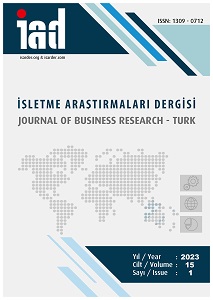Tüketici Dindarlığı ve Hazcı Tüketim Arasındaki İlişkide Cinsiyetin Düzenleyici Rolü: Y Kuşağı Üzerine Bir Araştırma
Moderating Role of Gender on the Relationship between Consumer Religiosity and Hedonic Consumption: A Study on Generation Y
Author(s): Mustafa ÜnsalanSubject(s): Gender Studies, Behaviorism, Marketing / Advertising, Sociology of Religion
Published by: İşletme Araştırmaları Dergisi
Keywords: Consumer religiosity; Hedonic consumption; Generation Y;
Summary/Abstract: Purpose – Religion, one of the subculture categories, is a subject that is discussed by marketing practitioners and researchers as a factor affecting consumer behavior. In addition, hedonistic consumption can be defined as one of the phenomena that explains the reasons for purchasing behavior. Although there are a significant number of studies examining the effect of religion on consumer behavior, there is no study that specifically analyzes the relationship between consumer religiosity and hedonistic consumption. The aim of this study is to examine how consumer religiosity affects hedonic consumption in the Y generation and the moderator role of gender in this relationship. Design/methodology/approach – The sample of the study consists of individuals born between 1980-1999 living in Nevşehir province. Quantitative research method and explanatory research technique were used. Convenience sampling method was preferred, and data were collected by questionnaire. A model testing the moderator role of gender in the relationship between consumer religiosity and hedonistic consumption tendencies was established. A 10-item scale developed by Mokhlis (2009) for consumer religiosity and a scale consisting of 18 items developed by Arnold and Reynolds (2003) for hedonistic consumption was used. Hypotheses were tested through regression analysis, independent sample t-test, and PROCESS Macro test. Findings – In the study, it was found that consumer religiosity has a positive and significant effect on hedonistic consumption, and that gender does not have a moderating role. Discussion – According to the results of the analysis for the hypothesis tests, it was found that consumers with high levels of religiosity showed hedonistic consumption tendency among their product/brand preferences and this tendency did not differ according to gender. While previous studies in the literature revealed that consumers with high levels of religiosity tend to consume less hedonistic, this study obtained a different result from them. The fact that the sample is different and that religious consumers enjoy consuming products in accordance with their own beliefs reveal the difference between the studies. At this point, it is recommended to test the relationship between variables with different samples in future studies.
Journal: İşletme Araştırmaları Dergisi
- Issue Year: 15/2023
- Issue No: 1
- Page Range: 514-530
- Page Count: 18
- Language: Turkish

